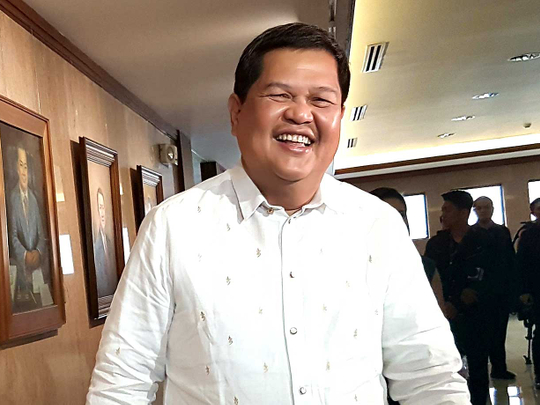
MANILA
Incoming Philippine central bank governor Nestor Espenilla vowed on Tuesday to strengthen oversight of the financial system to protect it from criminals even as he assured the market he would continue and build on his predecessor’s policies and reforms.
Espenilla, who now heads banking supervision, said he would also work with other agencies to develop the debt market to support Philippine President Rodrigo Duterte’s multibillion dollar infrastructure plan.
“It’s all about continuing what we have been doing in our constant surveillance of the monetary and financial system to make sure that it is resilient and stable,” Espenilla said at his first news conference since he was named central bank chief on Monday.
Espenilla, who will take over from Amando Tetangco in July, plans to work with Congress to relax bank secrecy rules, include casinos in the anti-money laundering law and strengthen the central bank’s charter to “increase the effectiveness of our oversight over the financial system.” “We are deeply committed to protecting the integrity of the financial system against criminal elements,” Espenilla said.
“It is the BSP’s job to make sure that the banking system prevents the entry of illegal funds into the system. And also, if they enter the system, they should be detected by the system,” the 36-year veteran central banker said.
The exclusion of casinos from the current scope of the anti-money laundering laws and a strict bank secrecy law have made it difficult for authorities to track the money from the Bangladesh bank heist last year and identify the perpetrators.
The Philippines is also struggling to control the flow of money that funds Islamic militant attacks in the south.
‘Plus, Plus’
The selection of Espenilla as central bank chief comes ahead of a policy meeting on Thursday, and ends months of speculation about what could be the most important appointment of Duterte’s presidency.
Duterte’s choice offers a degree of comfort to investors and financial markets as Espenilla has pledged to continue his predecessor’s policies that have kept the economy humming and inflation in check.
“I’d like to look at it as a continuity ‘plus plus’,” he said earlier on Tuesday in an interview with news channel ANC.
“To me, the plus element really is to find innovative ways to make our financial system even more responsive to the broader Philippine community.” Overseen by Tetangco, monetary policy and reforms kept the Philippines’ banks sound, the peso and inflation stable and sustained the country’s strong economic growth.
Analysts have largely praised the appointment of 58-year-old Espenilla whose many years with the central bank they say would help him to hit the ground running when he starts work on July 2.
Espenilla has driven many of the country’s recent banking reforms, including raising minimum capital requirements, improving financial transparency, and overhauling mismanaged banks.
Finance Secretary Carlos Dominguez told Reuters on Tuesday Espenilla would provide the “continuity of good macroeconomic and monetary policies” that should support Duterte’s economic agenda.
On the conduct of monetary policy, Espenilla said there would be no significant departure from the current process, adding that the interest rate corridor system will continue.
But to make it more efficient, he said the central bank would review existing reserve requirement policies and foreign exchange controls.
Asked about his monetary policy outlook, Espenilla said he does not “really like to characterise things in terms of dovishness and hawkishness.” “We rely a lot on data and we will continue to sharpen our analysis and react accordingly,” he said.












